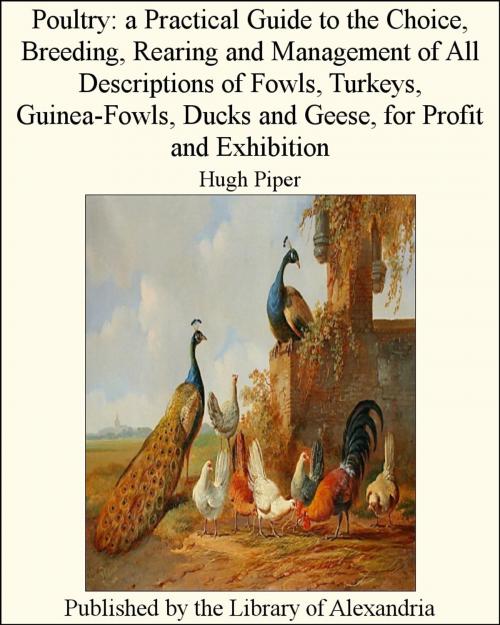Poultry: A Practical Guide to the Choice, Breeding, Rearing and Management of All Descriptions of Fowls, Turkeys, Guinea-Fowls, Ducks and Geese, for Profit and Exhibition
Nonfiction, Religion & Spirituality, New Age, History, Fiction & Literature| Author: | Hugh Piper | ISBN: | 9781465518484 |
| Publisher: | Library of Alexandria | Publication: | March 8, 2015 |
| Imprint: | Language: | English |
| Author: | Hugh Piper |
| ISBN: | 9781465518484 |
| Publisher: | Library of Alexandria |
| Publication: | March 8, 2015 |
| Imprint: | |
| Language: | English |
Until of late years the breeding of poultry has been almost generally neglected in Great Britain. Any kind of mongrel fowl would do for a farmer's stock, although he fully appreciated the importance of breeding in respect of his cattle and pigs, and the value of improved seeds. Had he thought at all upon the subject, it must have occurred to him that poultry might be improved by breeding from select specimens as much as any Other kind of live stock. The French produce a very much greater number of fowls and far finer ones for market than we do. In France, Bonington Mowbray observes, "poultry forms an important part of the live stock of the farmer, and the poultry-yards supply more animal food to the great mass of the community than the butchers' shops"; while in Egypt, and some Other countries of the East, from time immemorial, vast numbers of chickens have been hatched in ovens by artificial heat to supply the demand for poultry; but in Great Britain poultry-keeping has been generally neglected, eggs are dear, and all kinds of poultry so great a luxury that the lower classes and a large number of the middle seldom, if ever, taste it, except perhaps once a year in the form of a Christmas goose, while hundreds of thousands cannot afford even this. It is computed that a million of eggs are eaten daily in London and its suburbs alone; yet this vast number only gives one egg to every three mouths. "It is a national waste," says Mr. Edwards, "importing eggs by the hundreds of millions, and poultry by tens of thousands, when we are feeding our cattle upon corn, and grudging it to our poultry; although the return made from the former, it is generally admitted, is not five per cent. beyond the value of the corn consumed, whereas an immense percentage can be realised by feeding poultry." A writer in the Times, of February 1, 1853, states that, while it will take five years to fatten an ox to the weight of sixty stone, which will produce a profit of £30, the same sum may be realised in five months by feeding an equal weight of poultry for the table. Although fowls are so commonly kept, the proportion to the population is still very small, and the number of those who rear and manage them profitably still smaller, chiefly because most people keep them without system or order, and have not given the slightest attention to the subject. Nevertheless, it costs no more trouble and much less expense to keep fowls successfully and profitably, for neglected fowls are always falling sick, or getting into mischief and causing annoyance, and often expense and loss. "A man," says Mr. Edwards, "who expects a good return of flesh and eggs from fowls insufficiently fed and cared for, is like a miller expecting to get meal from a neglected mill, to which he does not supply grain." The antiquated idea that fowls on a farm did mischief to the crops has been proved to be false; for if the grain is sown as deeply as it should be, they cannot reach it by scratching; and, besides, they greatly prefer worms and insects. Mr. Mechi says, "commend me to poultry as the farmer's best friend," and considers the value of fowls, in destroying the vast number of worms, grubs, flies, beetles, insects, larvæ, &c., which they devour, as incalculable; and the same may be said as to their destruction of the seeds of weeds. They also consume large quantities of kitchen and table refuse, which is generally Otherwise wasted, and often allowed to decay and become a source of disease, or at least of impurity. The enormous prices paid at the poultry shows of 1852 and 1853 for fancy fowls gave a new impulse to poultry-keeping; and many persons who formerly thought the management of poultry beneath their attention, now superintend their yards. Mrs. Ferguson Blair, now the Hon. Mrs. Arbuthnot, the authoress of the "Henwife," whose experience may be judged by the fact that she gained in four years upwards of 460 prizes in England and Scotland, and personally superintended the management of forty separate yards, in which above 1,000 chickens were hatched annually, says
Until of late years the breeding of poultry has been almost generally neglected in Great Britain. Any kind of mongrel fowl would do for a farmer's stock, although he fully appreciated the importance of breeding in respect of his cattle and pigs, and the value of improved seeds. Had he thought at all upon the subject, it must have occurred to him that poultry might be improved by breeding from select specimens as much as any Other kind of live stock. The French produce a very much greater number of fowls and far finer ones for market than we do. In France, Bonington Mowbray observes, "poultry forms an important part of the live stock of the farmer, and the poultry-yards supply more animal food to the great mass of the community than the butchers' shops"; while in Egypt, and some Other countries of the East, from time immemorial, vast numbers of chickens have been hatched in ovens by artificial heat to supply the demand for poultry; but in Great Britain poultry-keeping has been generally neglected, eggs are dear, and all kinds of poultry so great a luxury that the lower classes and a large number of the middle seldom, if ever, taste it, except perhaps once a year in the form of a Christmas goose, while hundreds of thousands cannot afford even this. It is computed that a million of eggs are eaten daily in London and its suburbs alone; yet this vast number only gives one egg to every three mouths. "It is a national waste," says Mr. Edwards, "importing eggs by the hundreds of millions, and poultry by tens of thousands, when we are feeding our cattle upon corn, and grudging it to our poultry; although the return made from the former, it is generally admitted, is not five per cent. beyond the value of the corn consumed, whereas an immense percentage can be realised by feeding poultry." A writer in the Times, of February 1, 1853, states that, while it will take five years to fatten an ox to the weight of sixty stone, which will produce a profit of £30, the same sum may be realised in five months by feeding an equal weight of poultry for the table. Although fowls are so commonly kept, the proportion to the population is still very small, and the number of those who rear and manage them profitably still smaller, chiefly because most people keep them without system or order, and have not given the slightest attention to the subject. Nevertheless, it costs no more trouble and much less expense to keep fowls successfully and profitably, for neglected fowls are always falling sick, or getting into mischief and causing annoyance, and often expense and loss. "A man," says Mr. Edwards, "who expects a good return of flesh and eggs from fowls insufficiently fed and cared for, is like a miller expecting to get meal from a neglected mill, to which he does not supply grain." The antiquated idea that fowls on a farm did mischief to the crops has been proved to be false; for if the grain is sown as deeply as it should be, they cannot reach it by scratching; and, besides, they greatly prefer worms and insects. Mr. Mechi says, "commend me to poultry as the farmer's best friend," and considers the value of fowls, in destroying the vast number of worms, grubs, flies, beetles, insects, larvæ, &c., which they devour, as incalculable; and the same may be said as to their destruction of the seeds of weeds. They also consume large quantities of kitchen and table refuse, which is generally Otherwise wasted, and often allowed to decay and become a source of disease, or at least of impurity. The enormous prices paid at the poultry shows of 1852 and 1853 for fancy fowls gave a new impulse to poultry-keeping; and many persons who formerly thought the management of poultry beneath their attention, now superintend their yards. Mrs. Ferguson Blair, now the Hon. Mrs. Arbuthnot, the authoress of the "Henwife," whose experience may be judged by the fact that she gained in four years upwards of 460 prizes in England and Scotland, and personally superintended the management of forty separate yards, in which above 1,000 chickens were hatched annually, says















